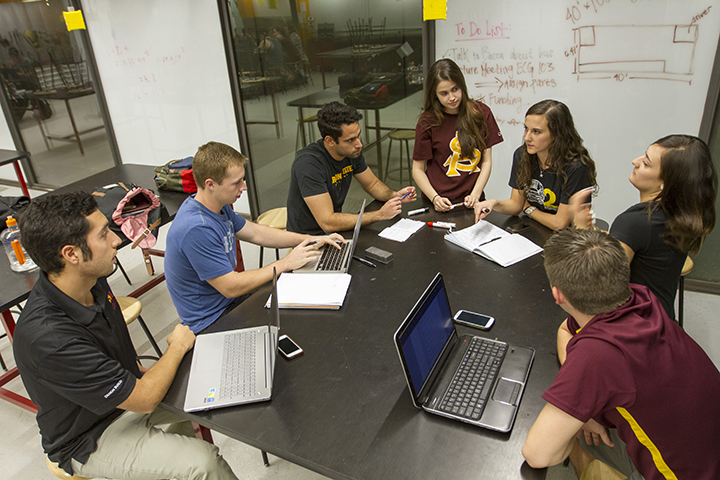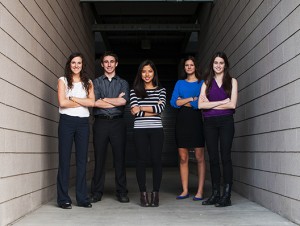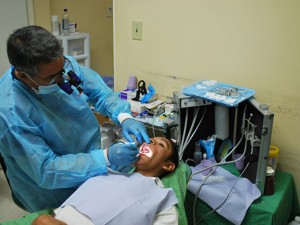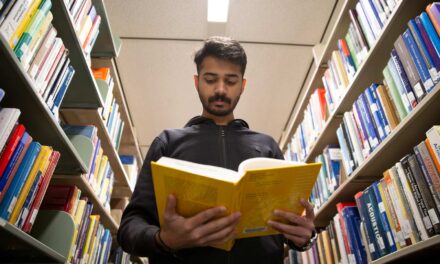
Engineering Smiles looks to mobilize dental care abroad


The Engineering Smiles team, left to right: Sara Mantlik, Nick Kemme, Christine Bui, Jackie Janssen and Fionnuala McPeake. Not pictured: Andrea Kemmerrer. For nearly three years the team has worked to design, build and deliver a mobile dental clinic to aid the non-profit organization IMAHelps on their missions to Central and South America. Photographer: Jessica Hochreiter/ASU
For millions, proper dental care is an unattainable luxury. No access to dentistry can lead to a host of potentially fatal health issues and even affect social mobility. A disfigured smile can limit employment opportunities and result in undeserved social stigma.
Since fall 2013, an engineering-led team of six Arizona State University students has been working to help provide dental services to those in need.
Engineering Smiles, a project that started in Engineering Projects in Community Service (EPICS), has spent the last three years working to design, build and deliver a mobile dental clinic which will bring dental care to developing nations. EPICS pairs multidisciplinary student teams with a project aimed at helping a nonprofit, community or governmental agency solve an engineering problem. For their project, Engineering Smiles partnered with IMAHelps, a California-based nonprofit that provides medical and dental care to underprivileged populations in Central and South America.
Currently, Engineering Smiles are in their final fundraising push, with a total goal of $180,000. They’ve collected about $46,000, which will be used to purchase a trailer frame to house the clinic later this spring. Additional donations will go toward dental equipment as well as storage and furnishings for the interior of the clinic. The project is also accepting in-kind donations of dental equipment or materials for use in the construction of the clinic.
Project manager and mechanical engineering student Sara Mantlik invites to join the almost 100 other project supporters in helping the team mobilize dental care.
“The completion of this project will not only benefit thousands of people in need, but also supports a student-run initiative which has lead to professional growth and development,” said Mantlik.
The team also includes mechanical engineering students Andrea Kemmerrer and Nick Kemme; biomedical engineering students Jackie Janssen and Fionnuala McPeake and architectural studies alumna Christine Bui.
The fully operational, dual dental station clinic will be housed in a 24-foot trailer outfitted with a contained electrical system and air conditioning. Mantlik noted the importance of providing IMAHelps with a mobile dental workspace that would be capable of operating in a variety of environments.
“This clinic will be deployed to places where the infrastructure isn’t always capable of supporting the delivery of a shipping container, so we opted for a trailer,” said Mantlik, who went on a mission to El Salvador with IMAHelps in August 2015.
On that mission, Mantlik was able to determine how the Engineering Smiles clinic could best serve IMAHelps’ missions. She received direct input and design critiques from volunteers who would be using the facility.
“I was able to see firsthand how they work, from patient intake to length of procedures,” said Mantlik. “Overall I was able to really figure out what they need.”
She also witnessed the incredible hardships volunteers face on these missions. Working 12-hour days in austere conditions, dental hygienists and dentists often lack functional workspaces and access to electricity. Resources and space can be so scarce Mantlik and other volunteers once resorted to digging through a junkyard, where they found an old massage table that they cleaned up for use as a workstation.
Upon completion, the clinic will see use stateside before heading to Nicaragua. The Engineering Smiles team is in the process of establishing local partnerships to use the clinic for outreach in underserved Native American communities in Arizona and Southern California. The clinic will then be shipped to Universidad Católica de Nicaragua, where it will be used as a training aide for dentistry students when not in use by IMAHelps.

Dr. Tony Gonzalez, a volunteer dentist with IMAHelps, treats a patient on the August 2015 mission to El Salvador. Engineering Smiles’ mobile dental clinic is anticipated to expand IMAHelps’ outreach efforts by at least 100 patients per mission, as well as providing them with a stable and functional work environment. Photograher: Marilyn Chung/ Desert Sun Newspaper
On their recent mission to El Salvador, IMAHelps conducted 5,923 patient consultations and treatments, including 448 dental consultations. Engineering Smiles anticipates that the mobile clinic will expand their capacity to at least 100 patients per mission.
“It’s hard to anticipate the impact the clinic will have with dentists and hygienists using it to train, as well as outreach by the university,” added Mantlik.
Though the team is nearing completion of this nearly three-year endeavor, it was a long road to this point.
“This project has been difficult and there were times I wanted to quit,” recalled Mantlik. “All I needed to do is talk to the people at IMAHelps, who are so passionate and caring. That motivated me to continue.”
One aspect of EPICS is to foster entrepreneurial thinking and skills not necessarily learned in the classroom. The team of mostly engineers had to step outside their comfort zones to meet the challenges of the project. No one had any idea how to create construction documents, or how to fundraise or run a marketing campaign, said Mantlik.
“They’re the epitome of an EPICS team; their persistence through adversity, commitment to delivering, and desire to make a difference has been incredible to watch,” said Scott Shrake, director of EPICS. “The team has learned so much about what it takes to be real engineers and change makers, and it’s exciting to see them so close to delivery.”
For more information about Engineering Smiles or to make a donation, visit them online.



































